Young engineers making their contribution to change
By ewbexec
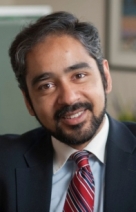 Hello everyone! Hopefully everyone has had a lovely spring break and are looking forward to the next couple of months before summer vacation.
Hello everyone! Hopefully everyone has had a lovely spring break and are looking forward to the next couple of months before summer vacation.
In recent news, check out the blog posts of Professor Muhammad Zaman, advisor to our BU chapter of Engineers Without Borders, on The Huffington Post! With titles such as “Make Development Part of the Equation” and “Engineering a Healthy Tomorrow for the Poorest Billions,” Zaman looks at the greater context of engineering in today’s world and the impact it can have on the lives of billions in the future. It’s incredible, he says, that engineering has led to such technological innovations and accomplishments already, such as “sending the man on the moon and building bridges and buildings that defy imagination.” Hopefully, continued imagination and creativity and hard work on the part of global engineers can continue this trend, with the focus of using engineering to better the lives of those in the poorest countries. While in recent years engineering programs have seen a decline in the number of applicants and interested individuals, this field has enormous implications for the future.
With the world’s population over 7 billion people and growing at an exponential rate (http://ngm.nationalgeographic.com/7-billion), efforts must be made so that the poorest regions in the world are not held back, or regress, due to a disparity in resources and innovation and education, but instead are encouraged to progress and create the foundation for a healthy and sustainable future by investing in education and innovation. It is imperative that the conditions today in the poorest countries – including a lack of proper infrastructure, inadequate health services, etc. – not set the tone for the future. As Zaman says, “gone are the days when we accepted disease, suffering and poverty as the common lot of the poor.” It is no longer acceptable to simply sit back on our laurels when there are issues that can be acted upon and situations that need to be changed. It’s not an option to let such suffering continue. And engineers play a big part in ensuring that this idea of growth and progress, even in the poorest of countries, come to fruition in the future. Ultimately, everyone benefits from this investment in the future. “The creation of new knowledge and new paradigms to address the global problems will inevitable lead to discovery of new, cheaper and robust design criteria that will have an impact on all societies, including ours, here in the US.”
And this is something that the BU chapter of Engineers Without Borders is working on. We hope that our project in Zambia, in partnership with the Center for Global Health and Development (CGHD) and the Zambia Center for Applied Health Research and Development (ZCAHRD), will help to contribute toward alleviating the current situation with HIV test results. For more information on our project, click the following link: http://people.bu.edu/ewbexec/Projects.html.
To read Professor Zaman’s blog posts, click the following link: http://www.huffingtonpost.com/muhammad-h-zaman
By ewbexec

5... 4... 3... 2... 1... We're Live!
Check out our new website for the EWB-BU Student Chapter! It's got the most recent information on our events and projects, such as our work with CGHD (Center for Global Health and Development) and the Zambia Center for Applied Health Research and Development (ZCAHRD) in addition to details about our upcoming Marshmallow Challenge for E-Week!
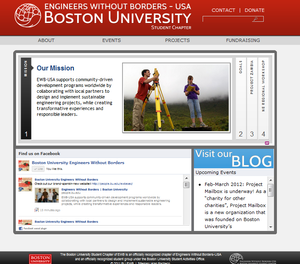
On our new website, you can get updates from our Facebook page, this blog, among many other things. We've also set up a donation link! Looking to get involved with EWB-BU? Look into our Contact Information and shoot us an e-mail! We'll be looking to add to the site a lot more in the future, so be sure to give us your feedback! Our brand new website, courtesy of our Webmaster Alan Pacheco, can be used in the future, with our Facebook page and our blog, to get information about our group. Be sure to stop by!
Link to our NEW website: http://people.bu.edu/ewbexec/
By ewbexec
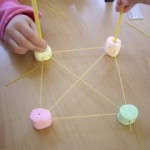 This year, the Boston University chapter of EWB has teamed up with ENG GOV 2015 to bring you the Marshmellow Challenge! The objective is the make the tallest tower using just spaghetti noodles, tape, and a marshmellow. E-week is a tradition that was brought about in 1951 by the National Society of Professional Engineers to highlight the important contributions engineers make to society. This year's E-Week, which runs from Tuesday, February 21st to Friday, March 2nd, features a host of excitingevents such as the Egg Drop Contest, the K'Nex Roller Coaster Design Contest, a Wii Tournament, and the Marshmellow Challenge!
This year, the Boston University chapter of EWB has teamed up with ENG GOV 2015 to bring you the Marshmellow Challenge! The objective is the make the tallest tower using just spaghetti noodles, tape, and a marshmellow. E-week is a tradition that was brought about in 1951 by the National Society of Professional Engineers to highlight the important contributions engineers make to society. This year's E-Week, which runs from Tuesday, February 21st to Friday, March 2nd, features a host of excitingevents such as the Egg Drop Contest, the K'Nex Roller Coaster Design Contest, a Wii Tournament, and the Marshmellow Challenge!

We'll also be accepting orders for our new EWB T-shirts! Come by and place an order and drop by for some engineering fun!
The Marshmellow Challenge is on Thursday, February 23rd at 5 pm - 6:30 pm in CAS B14. We're looking forward to seeing you all there!
Additional details about the events can be found at:
http://www.bu.edu/eng/current-students/annual-events/eweek/
By ewbexec
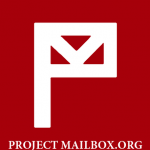 We've been approved by Project Mailbox for a February fundraiser! As a "charity for other charities", Project Mailbox is a new organization that was founded on Boston University's campus. Each month it helps raise both awareness and funds for different non-profits. Luckily for us, we're partnering with them for this month! If you're wandering down Comm Ave, you'll notice a red and white mailbox standing by Warren Towers that's right outside of University Grill at 712 Commonwealth Avenue. You can drop in change, cash, or checks to support our work in Zambia! So if you find yourself jangling with spare
We've been approved by Project Mailbox for a February fundraiser! As a "charity for other charities", Project Mailbox is a new organization that was founded on Boston University's campus. Each month it helps raise both awareness and funds for different non-profits. Luckily for us, we're partnering with them for this month! If you're wandering down Comm Ave, you'll notice a red and white mailbox standing by Warren Towers that's right outside of University Grill at 712 Commonwealth Avenue. You can drop in change, cash, or checks to support our work in Zambia! So if you find yourself jangling with spare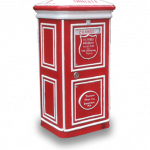 coinage in your pockets, swing by the mailbox and drop it in! Every bit helps, and we are so excited to see the small acts of generosity total up as we roll into March. You can also donate online directly to our chapter here (just make sure you select "Boston University Chapter" under the "Allocate your funds" section!)
coinage in your pockets, swing by the mailbox and drop it in! Every bit helps, and we are so excited to see the small acts of generosity total up as we roll into March. You can also donate online directly to our chapter here (just make sure you select "Boston University Chapter" under the "Allocate your funds" section!)
So, before you toss your change onto your dresser where it'll be lost in the chaos of your room, think about swinging by 712 Comm Ave to help out the Naluja community in Zambia.
By ewbexec
Here at EWB-Boston University, we've been hard at work adding new materials to help train our future officers, write grant proposals, and assemble records of our research. We're getting geared up to start another semester, and our first general meeting will be in two days on Sunday, January 22 at 12:30 pm in CAS 204A. We'll be discussing our next steps with funding, travel, and elections. We're most excited for elections!
We're hosting our elections for the 2012-13 school year on Sunday, January 29 and we'll start our transition program right after our candidates hash it out with some inspired speeches! From discussions with our MCN partners and other EWB chapters, leadership transition is one of the must critical and difficult pieces of being a successful student organization. Transferring knowledge and skills is a mix of resources, mentorship, and practice. Some of the documents we've created to help our new officers discuss everything from "How to Run a Meeting" to "How to Silent Auction".
Another big piece of our spring semester plans include formally introducing our technical advisors to our current research on cell phone signal amplification. Part of this will be aided by the records we've been generating over the break, and face-to-face discussion amongst our officers and research teams. Hopefully, the most important lessons learned will be highlighted and explored further as we invite our advisors' expertise into the conversation.
By ewbexec
At Boston University, we've been busily working on getting our program approved in Zambia, and were fortunate enough to overcome a setback when the EWB Assessment Review Committee (ARC) initially rejected our 501-New Program Application. This is not unusual, according to a contact in the EWB-Boston Professional Chapter. However, it was more than difficult to see months of hard work rejected.
Thankfully, we were able to talk to Dave Sacco, an ARC and TAC (Technical Advisory Committee) reviewer. He offered some great insight into how to successfully appeal and apply for our Program in Zambia. Thanks to Dave's help, we were approved to open our program! Here are some of the things we learned from his short seminar:
A program is a chapter's overarching commitment to collaboration between the chapter and community for the minimum 5 years required by EWB-USA. In comparison, a project is a small piece within a program. Projects are implemented to address the needs identified by the community.
While the distinction between these two things is relatively fine, it's important to recognize their unique identity. There may be many projects you could implement that pertain to the program's theme. In our case, we're looking to focus on community health. As a part of this program, we could implement a water filtration project, a sanitation project, or the cell phone amplification project we've been looking at. Allowing for this type of flexibility allows EWB chapters to approach the needs of the community holistically.
When filling out your initial New Program application, you shouldn't have all the answers or solutions. This is a red flag for ARC reviewers that you have too many preconceptions as you enter into this program.
While it can be difficult to respond to the questions the 501 may ask because it seems to want explicit answers or details, Mr. Sacco stated that ambiguity should be expected during these first steps. You haven't, in theory, been on the ground and met your community face-to-face, yet. If anything, you may have some prospective leads on projects, but these projects cannot be successfully implemented or approved until you have gathered primary evidence and data about what the community needs and the best way to sustainably implement a solution.
In our past program in Peru, we experienced a great example of this. The community, during initial contact, discussed a desire for electricity. Based on the information our chapter had received, it seemed like solar panels would fit their needs. However, on the assessment trip, it became clear that while they could benefit from electricity, they were dying from contaminated water. From this, a new plan of action was charted to find a way to purify their water sources. Only once we had been on-site were we able to obtain a complete picture of what our community was dealing with and how to prioritize potential projects.
Make sure your community and partnering NGO are clear on who owns the projects and who ought to be the primary beneficiaries.
Although it may seem obvious, Dave Sacco reminded the seminar attendees to be clear during your discussion with partner NGOs, the government, and community leaders that your purpose as an EWB chapter is to collaboratively implement projects that address the needs the community faces. This means that the primary motivation for your work is always the community--not the NGO, not the government--the community. If this is not obvious in from your New Program application, it will not be approved by EWB.
Now that the New Year has just begun, EWB-USA will be implementing a new system to open New Programs. Now, the community or partner NGO must submit the 501 and the EWB chapter must adopt it by filling out a different form, the 502. By doing this, EWB-USA hopes to engage communities and NGOs that are invested in collaboration and actively seeking solutions. According to Dave Sacco, it seemed that EWB chapters have struggled in the past to successfully screen communities that would successfully work with the chapter. By changing the New Program application structure, hopefully, more chapters will enjoy successful and fulfilling programs with partnering communities.
By ewbexec
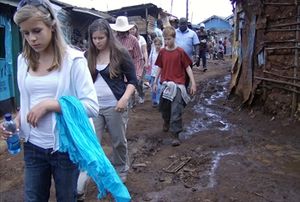 Poverty tourism. It's one of the biggest concerns we have as an organization. Cathy Leslie, the EWB-USA Director, specifically addressed it in her Annual update, and we felt it was fitting to kick off the series on the topic. So, what exactly does this term mean? It has a few layers but in a quick sentence, it's when people visit impoverished communities and, usually, drop off 'solutions, snap some photos with locals, and leave..never to be heard from again.
Poverty tourism. It's one of the biggest concerns we have as an organization. Cathy Leslie, the EWB-USA Director, specifically addressed it in her Annual update, and we felt it was fitting to kick off the series on the topic. So, what exactly does this term mean? It has a few layers but in a quick sentence, it's when people visit impoverished communities and, usually, drop off 'solutions, snap some photos with locals, and leave..never to be heard from again.
For EWB, we do not accept this system. We cannot accept being tourists. We must be engaged, committed, and honest in our intentions and efforts. How else can we expect to make change? How else can we expect communities to have hope? Cathy Leslie reminded us that this is what we're striving to attain--a sustainable and lasting impact. As an EWB chapter, we reside in the "big picture".
For our own budding program in Zambia, we're still learning. For a lot of us, this is our first attempts to really step into the arena of global development in a working relationship. As an Executive Team, we're trying to relay that distinction between international development and poverty tourism to our members. Because even if they drift away or never do anything related to EWB after college, they'll still have that exposure to the complexities folded into the work of development groups.
By ewbexec
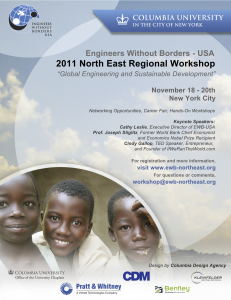 EWB-Boston University has successfully returned from a jam-packed weekend of workshops, speakers, and subway rides in the Upper West Side. The 2011 Northeast Regional Conference was hosted by the Columbia University chapter, and they did a great job of lining up speakers, organizing the attendees, and facilitating the event's success. In particular, the conference heralded speakers like the Executive Director of EWB-USA and a Nobel Peace Prize laureate. There were workshops spanning member and leader training, cell phone application in Sub-Saharan Africa, fundraising, and the EWB program application process. Just like the Millennium Campus Conference, we'll be posting a series of articles featuring some of the key takeaways we identified for our chapter and the lessons shared by the speakers. So stay tuned!
EWB-Boston University has successfully returned from a jam-packed weekend of workshops, speakers, and subway rides in the Upper West Side. The 2011 Northeast Regional Conference was hosted by the Columbia University chapter, and they did a great job of lining up speakers, organizing the attendees, and facilitating the event's success. In particular, the conference heralded speakers like the Executive Director of EWB-USA and a Nobel Peace Prize laureate. There were workshops spanning member and leader training, cell phone application in Sub-Saharan Africa, fundraising, and the EWB program application process. Just like the Millennium Campus Conference, we'll be posting a series of articles featuring some of the key takeaways we identified for our chapter and the lessons shared by the speakers. So stay tuned!
In the meantime, we're gearing up to travel back to Boston and share our new ideas with the group so we can see what their take on it is and how they think we can customize it to fit our group's needs.
By ewbexec
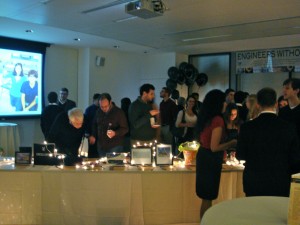 It's all over folks! Our Silent Auction was super successful and we were so happy to see faculty, members, and students coming out to join us as we shared a little bit about what our mission is as a non-profit and our newest project in Zambia. Our spectacular faculty advisor, Professor Muhammad Zaman, gave us a peek into what engineering global development looks like and whythese projects are so important to those living in places and conditions so unlike our own.
It's all over folks! Our Silent Auction was super successful and we were so happy to see faculty, members, and students coming out to join us as we shared a little bit about what our mission is as a non-profit and our newest project in Zambia. Our spectacular faculty advisor, Professor Muhammad Zaman, gave us a peek into what engineering global development looks like and whythese projects are so important to those living in places and conditions so unlike our own.
Our Executive Team also gave a short presentation on their history and current direction as a group. An emphasis was placed on our effort to strengthen our bonds with groups like the EWB Boston Professional
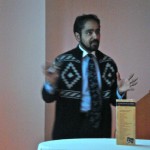
Chapter and the Millennium Campus Network. Plus, the Center for Global Health and Development was recognized as a critical partner for our newest project in Zambia. However, our Co-President was quick to remind the crowd that we are a student organization made up of 19 and 20 year olds. Sowhile we may be "saving the world" we're also trying not to take ourselves too seriously.
After the final call for bids was made, the winners were announced and we had some great prizes including a $100 Best Buy gift card and an overnight stay for two at Hotel Commonwealth. Our final tally was a $1000--that's money we can now dedicate to funding our project! Just like every year, we could not have done this alone. The generosity of our donor
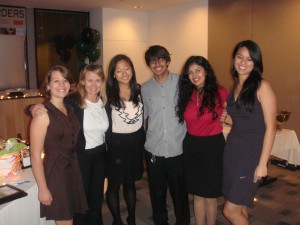 s and supporters never ceases to humble us: Saana McDaniel, our mentor and cheerleader as we planned this event and took a few risks, the BU Engineering Alumni Office who was kind enough to add us to their Alumni Weekend events, and all of the guests who attended to hear a little more about us. Finally, we'd liketo recognize our Treasurer and Silent Auction Chair, Grace Wang, who dedicated hours and hours to the planning of this event. From the catering menu to the background music, she did an incredible job--way to go! We're so excited for next year and we hope to see you all there!
s and supporters never ceases to humble us: Saana McDaniel, our mentor and cheerleader as we planned this event and took a few risks, the BU Engineering Alumni Office who was kind enough to add us to their Alumni Weekend events, and all of the guests who attended to hear a little more about us. Finally, we'd liketo recognize our Treasurer and Silent Auction Chair, Grace Wang, who dedicated hours and hours to the planning of this event. From the catering menu to the background music, she did an incredible job--way to go! We're so excited for next year and we hope to see you all there!
By ewbexec
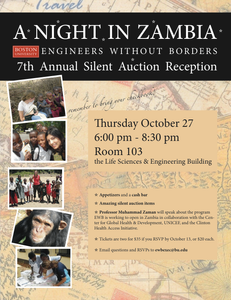 We hope you’ve enjoyed our short series featuring some of the awesome speakers we heard from at the Millennium Campus Conference. After returning from the conference energized and inspired, we’re now busily working on our 7th Annual Silent Auction Reception for Thursday, October 27 6:00-8:30 pm. As our main fundraising event, we invite faculty, alumni, and our peers to support our work by bidding on items while they chat over appetizers and drinks. Our advisor, Professor Muhammad Zaman, will be introducing our work in Zambia in a short presentation.
We hope you’ve enjoyed our short series featuring some of the awesome speakers we heard from at the Millennium Campus Conference. After returning from the conference energized and inspired, we’re now busily working on our 7th Annual Silent Auction Reception for Thursday, October 27 6:00-8:30 pm. As our main fundraising event, we invite faculty, alumni, and our peers to support our work by bidding on items while they chat over appetizers and drinks. Our advisor, Professor Muhammad Zaman, will be introducing our work in Zambia in a short presentation.
Like any event, the majority of the details are finalized in the last 3 weeks. As of Thursday, we passed the 2 week mark. A catering menu has been submitted, floor plans designed, and a flurry of advertisement activity. Perhaps the most nerve-wracking piece of the auction is awaiting the arrival of donation items. We’ve been steadily adding to our inventory, but we’re making a last push to contact our local businesses in an effort to win their support. Oh, we fear rejection just like any preteen trying to arrange their first date—excuse our poor analogy, but we are engineers! 🙂
However, whether or not we make a million dollars or fifty dollars, we’re really just glad to organize an event to celebrate the work we’re doing and raise awareness of the role engineers have to play in global development. Although…we would definitely be more than happy to take that million dollars. That’s not greedy, right?
We hope to see all of our supporters there, and if you’re interested in attending email us at ewbexec@bu.edu.
 Hello everyone! Hopefully everyone has had a lovely spring break and are looking forward to the next couple of months before summer vacation.
Hello everyone! Hopefully everyone has had a lovely spring break and are looking forward to the next couple of months before summer vacation.

 This year, the Boston University chapter of EWB has teamed up with ENG GOV 2015 to bring you the Marshmellow Challenge! The objective is the make the tallest tower using just spaghetti noodles, tape, and a marshmellow. E-week is a tradition that was brought about in 1951 by the
This year, the Boston University chapter of EWB has teamed up with ENG GOV 2015 to bring you the Marshmellow Challenge! The objective is the make the tallest tower using just spaghetti noodles, tape, and a marshmellow. E-week is a tradition that was brought about in 1951 by the 
 We've been approved by
We've been approved by  coinage in your pockets, swing by the mailbox and drop it in! Every bit helps, and we are so excited to see the small acts of generosity total up as we roll into March. You can also donate online directly to our chapter
coinage in your pockets, swing by the mailbox and drop it in! Every bit helps, and we are so excited to see the small acts of generosity total up as we roll into March. You can also donate online directly to our chapter  Poverty tourism. It's one of the biggest concerns we have as an organization. Cathy Leslie, the EWB-USA Director, specifically addressed it in her Annual update, and we felt it was fitting to kick off the series on the topic. So, what exactly does this term mean? It has a few layers but in a quick sentence, it's when people visit impoverished communities and, usually, drop off 'solutions, snap some photos with locals, and leave..never to be heard from again.
Poverty tourism. It's one of the biggest concerns we have as an organization. Cathy Leslie, the EWB-USA Director, specifically addressed it in her Annual update, and we felt it was fitting to kick off the series on the topic. So, what exactly does this term mean? It has a few layers but in a quick sentence, it's when people visit impoverished communities and, usually, drop off 'solutions, snap some photos with locals, and leave..never to be heard from again. EWB-Boston University has successfully returned from a jam-packed weekend of workshops, speakers, and subway rides in the Upper West Side. The 2011 Northeast Regional Conference was hosted by the Columbia University chapter, and they did a great job of lining up speakers, organizing the attendees, and facilitating the event's success. In particular, the conference heralded speakers like the Executive Director of EWB-USA and a Nobel Peace Prize laureate. There were workshops spanning member and leader training, cell phone application in Sub-Saharan Africa, fundraising, and the EWB program application process. Just like the Millennium Campus Conference, we'll be posting a series of articles featuring some of the key takeaways we identified for our chapter and the lessons shared by the speakers. So stay tuned!
EWB-Boston University has successfully returned from a jam-packed weekend of workshops, speakers, and subway rides in the Upper West Side. The 2011 Northeast Regional Conference was hosted by the Columbia University chapter, and they did a great job of lining up speakers, organizing the attendees, and facilitating the event's success. In particular, the conference heralded speakers like the Executive Director of EWB-USA and a Nobel Peace Prize laureate. There were workshops spanning member and leader training, cell phone application in Sub-Saharan Africa, fundraising, and the EWB program application process. Just like the Millennium Campus Conference, we'll be posting a series of articles featuring some of the key takeaways we identified for our chapter and the lessons shared by the speakers. So stay tuned! It's all over folks! Our Silent Auction was super successful and we were so happy to see faculty, members, and students coming out to join us as we shared a little bit about what our mission is as a non-profit and our newest project in Zambia. Our spectacular faculty advisor, Professor Muhammad Zaman, gave us a peek into what engineering global development looks like and whythese projects are so important to those living in places and conditions so unlike our own.
It's all over folks! Our Silent Auction was super successful and we were so happy to see faculty, members, and students coming out to join us as we shared a little bit about what our mission is as a non-profit and our newest project in Zambia. Our spectacular faculty advisor, Professor Muhammad Zaman, gave us a peek into what engineering global development looks like and whythese projects are so important to those living in places and conditions so unlike our own.
 s and supporters never ceases to humble us: Saana McDaniel, our mentor and cheerleader as we planned this event and took a few risks, the BU Engineering Alumni Office who was kind enough to add us to their Alumni Weekend events, and all of the guests who attended to hear a little more about us. Finally, we'd liketo recognize our Treasurer and Silent Auction Chair, Grace Wang, who dedicated hours and hours to the planning of this event. From the catering menu to the background music, she did an incredible job--way to go! We're so excited for next year and we hope to see you all there!
s and supporters never ceases to humble us: Saana McDaniel, our mentor and cheerleader as we planned this event and took a few risks, the BU Engineering Alumni Office who was kind enough to add us to their Alumni Weekend events, and all of the guests who attended to hear a little more about us. Finally, we'd liketo recognize our Treasurer and Silent Auction Chair, Grace Wang, who dedicated hours and hours to the planning of this event. From the catering menu to the background music, she did an incredible job--way to go! We're so excited for next year and we hope to see you all there! We hope you’ve enjoyed our short series featuring some of the awesome speakers we heard from at the Millennium Campus Conference. After returning from the conference energized and inspired, we’re now busily working on our 7th Annual Silent Auction Reception for Thursday, October 27 6:00-8:30 pm. As our main fundraising event, we invite faculty, alumni, and our peers to support our work by bidding on items while they chat over appetizers and drinks. Our advisor, Professor Muhammad Zaman, will be introducing our work in Zambia in a short presentation.
We hope you’ve enjoyed our short series featuring some of the awesome speakers we heard from at the Millennium Campus Conference. After returning from the conference energized and inspired, we’re now busily working on our 7th Annual Silent Auction Reception for Thursday, October 27 6:00-8:30 pm. As our main fundraising event, we invite faculty, alumni, and our peers to support our work by bidding on items while they chat over appetizers and drinks. Our advisor, Professor Muhammad Zaman, will be introducing our work in Zambia in a short presentation.